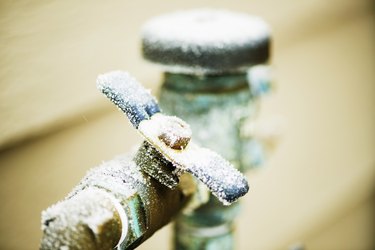Tips to Keep Your Pipes from Cold Weather Issues: Essential Advice
Tips to Keep Your Pipes from Cold Weather Issues: Essential Advice
Blog Article
We've come across the article on Helpful Tips to Prevent Frozen Pipes this Winter down the page on the web and accepted it made sense to discuss it with you on my blog.

Winter can wreak havoc on your plumbing, particularly by freezing pipes. Here's how to prevent it from happening and what to do if it does.
Introduction
As temperature levels drop, the risk of icy pipelines rises, potentially resulting in costly repairs and water damages. Recognizing exactly how to prevent icy pipelines is essential for homeowners in cool climates.
Prevention Tips
Protecting susceptible pipelines
Wrap pipelines in insulation sleeves or use warmth tape to safeguard them from freezing temperature levels. Focus on pipelines in unheated or exterior locations of the home.
Heating techniques
Maintain indoor rooms sufficiently heated up, specifically areas with pipes. Open up cabinet doors to enable cozy air to flow around pipes under sinks.
How to determine icy pipelines
Seek decreased water flow from faucets, unusual odors or noises from pipes, and visible frost on subjected pipes.
Long-Term Solutions
Structural adjustments
Think about rerouting pipes away from exterior wall surfaces or unheated locations. Include added insulation to attic rooms, basements, and crawl spaces.
Upgrading insulation
Buy high-quality insulation for pipelines, attics, and walls. Correct insulation aids preserve consistent temperature levels and minimizes the risk of icy pipes.
Protecting Outside Plumbing
Yard hoses and exterior faucets
Separate and drain yard hoses prior to winter. Set up frost-proof faucets or cover outside taps with insulated caps.
Comprehending Icy Pipes
What triggers pipelines to ice up?
Pipes freeze when subjected to temperature levels listed below 32 ° F (0 ° C) for extended periods. As water inside the pipes freezes, it broadens, taxing the pipe walls and potentially triggering them to break.
Threats and damages
Frozen pipelines can lead to water supply interruptions, residential or commercial property damage, and expensive repair work. Ruptured pipes can flood homes and cause comprehensive architectural damages.
Indicators of Frozen Pipeline
Recognizing frozen pipelines early can prevent them from bursting.
What to Do If Your Pipelines Freeze
Immediate activities to take
If you suspect frozen pipelines, maintain taps open to soothe stress as the ice melts. Use a hairdryer or towels taken in hot water to thaw pipelines slowly.
Verdict
Avoiding icy pipes requires positive actions and quick actions. By understanding the causes, indicators, and preventive measures, house owners can shield their plumbing during cold weather.
Helpful Tips to Prevent Frozen Pipes this Winter
UNDERSTANDING THE BASICS: WHY PIPES FREEZE AND WHY IT’S A PROBLEM
Water freezing inside pipes is common during the winter months, but understanding why pipes freeze, and the potential problems it can cause is crucial in preventing such incidents. This section will delve into the basics of why pipes freeze and the associated problems that may arise.
THE SCIENCE BEHIND FROZEN PIPES
When water reaches freezing temperatures, it undergoes a physical transformation and solidifies into ice. This expansion of water as it freezes is the primary reason pipes can burst. As the water inside the pipe freezes, it expands, creating immense pressure on the walls. If the pressure becomes too great, the pipe can crack or rupture, leading to leaks and water damage.
FACTORS THAT CONTRIBUTE TO PIPE FREEZING
Low Temperatures: Extremely cold weather, especially below freezing, increases the risk of pipes freezing. Uninsulated or Poorly Insulated Pipes: Pipes located in unheated areas, such as basements, crawl spaces, or attics, are more prone to freezing. Insufficient insulation or lack of insulation altogether exacerbates the problem. Exterior Wall Exposure: Pipes running along exterior walls are susceptible to freezing as they encounter colder temperatures outside. Lack of Heating or Temperature Regulation: Inadequate heating or inconsistent temperature control in your home can contribute to frozen pipes. PROBLEMS CAUSED BY FROZEN PIPES
- Pipe Bursting: As mentioned earlier, the expansion of water as it freezes can cause pipes to burst, resulting in significant water damage.
- Water Damage: When pipes burst, it can lead to flooding and water damage to your property, including walls, ceilings, flooring, and personal belongings.
- Structural Damage: Prolonged exposure to water from burst pipes can compromise the structural integrity of your home, leading to costly repairs.
- Mold and Mildew Growth: Excess moisture from water damage can create a favorable environment for mold and mildew growth, posing health risks to occupants.
- Disrupted Water Supply: Frozen pipes can also result in a complete or partial loss of water supply until the issue is resolved.
WHY CERTAIN PIPES ARE MORE PRONE TO FREEZING
- Location: Pipes located in unheated or poorly insulated areas, such as basements, crawl spaces, attics, or exterior walls, are at higher risk of freezing.
- Exterior Pipes: Outdoor pipes, such as those used for irrigation or exposed plumbing, are particularly vulnerable to freezing as they are directly exposed to the elements.
- Supply Lines: Pipes that carry water from the main water supply into your home, including the main water line, are critical to protect as freezing in these lines can affect your entire plumbing system.
- Underground Pipes: Pipes buried underground, such as those connected to sprinkler systems or outdoor faucets, can be susceptible to freezing if not properly insulated.
https://busybusy.com/blog/helpful-tips-to-prevent-frozen-pipes-this-winter/

Do you really like more info about 6 Ways to Prevent Frozen Pipes? Write feedback down the page. We will be delighted to hear your feelings about this blog entry. We hope that you come back again later on. Do you know about another individual who is excited by the subject? Please feel free to promote it. Kudos for your time. Don't hesitate to stop by our blog back soon.
Book Inspection Report this page